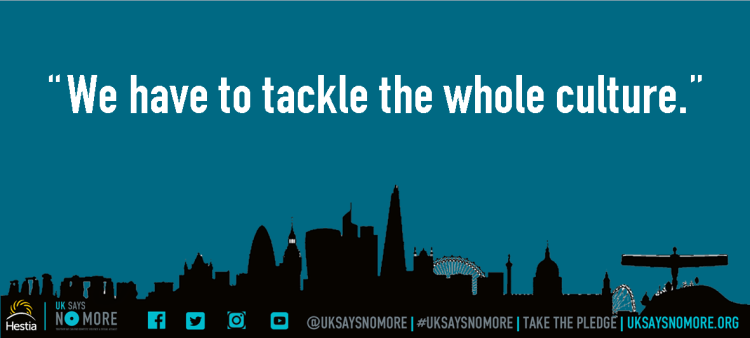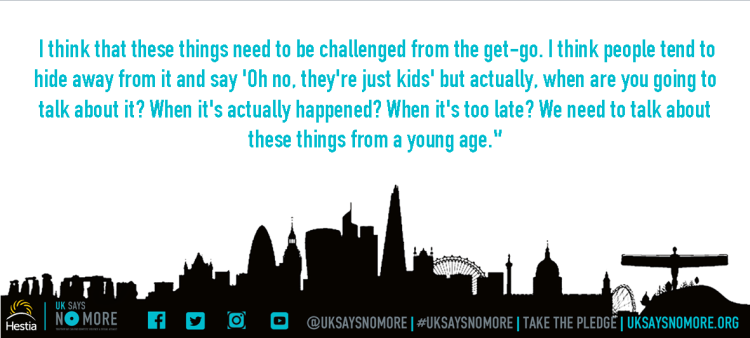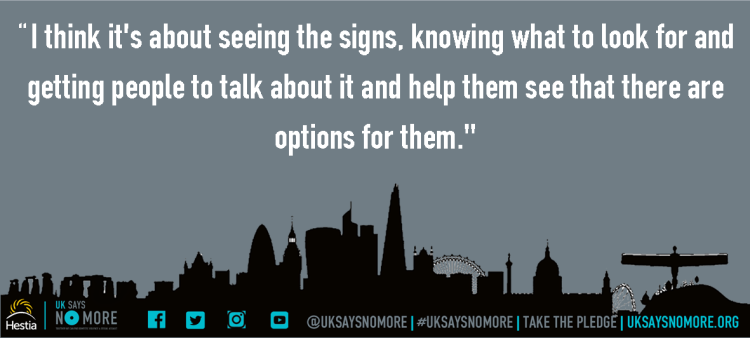Last year, as allegations of sexual harassment, abuse and assault gripped the world and made headline news, an opportunity arose.
For years, survivors of such atrocities have been working to no end to ensure that these allegations are taken seriously, and both domestic and sexual violence are eradicated. It’s a tough conversation for society to be having, especially as it is one that has, on the most part, been hidden behind closed doors – but an opportunity has arisen, for us all to be talking about it. And what’s more, to actually be doing something about it.
Domestic abuse and sexual violence are everybody’s problem. It’s on all of us to help put a stop to it. Little changes to our daily behaviours can make a world of difference.
Last week, we spoke to some members of the public about what little things they can be doing in their personal lives, as well as what we should all be doing as a society, to combat these issues. Here’s what they said.
#WhatICanDo:
“Talking. I think it would be good if there was a shared online platform for survivors to talk and share their experiences without having to share their identity. I think one of the more difficult things if you are a victim of abuse is to come forward as yourself – it may be easier for some people to come forward with anonymity. It would be good for all organisations that deal with abuse, such as charities, police, campaigns etc to create one large network, so that if I were to come forward and seek help I wouldn’t necessarily have to go direct to a police station. It would mean that someone would be able to anonymously pass on my information to somebody who could help me. Whilst it’s good for survivors to share their stories – it would also be good to know that afterwards there is an action.” – Lisa, 38, Account Manager
“We must learn more about the types of abuse and what work to dispel misconceptions about what sort of households domestic violence might occur in. I think if you’re aware of it, you’re able to see the signs that somebody might be a victim because it might not be physical. If you saw someone who came along with bruising, you might think ‘oh gosh, what has been going on with you’ and you might be able to get that person talking about it. But if it’s mental, emotional or financial abuse you might not see that. I think it’s about seeing the signs, knowing what to look for and getting people to talk about it and help them see that there are options for them.” – Winsom, 50+, Solicitor and Mentor
“I think you should be able to talk to people a bit more about that kind of thing and be supportive. I think when someone gets cat-called, depending on the severity of it, confronting people can be tricky, but I think you can comfort the victim of it if they seem to be in distress.” – Matt, 30, IT Support
“We should stop normalising domestic and sexual violence as something that is just a part of life. This also means in relationships – we need to make sure we are pointing out that controlling behaviours are not normal and should not be expected as part of a relationship. I think I personally can help with this by calling out certain language people use, and talking about the issues with people I know.” – Richard, 56, Database Assistant
“Picking up on things that perhaps aren’t considered that serious, like the derogatory things that people say, and telling them that they shouldn’t say them because it reinforces the idea that these things are OK and reinforces the culture around them. We have to tackle the whole culture. We need to be teaching kids about healthy relationships and picking up on things that they say in the playground.” – Amy, 21, Trainee Primary School Teacher

“I think we all need to work to clearly outline ‘consent’ as it is clear that many, for whatever reason, don’t know. I think another thing is challenging friends and family members – particularly older family members who may have an outdated view on what constitutes sexism or harassment. I know this is particularly difficult and can be awkward and uncomfortable but I think it’s necessary if we want to make real change.”- Luke, 22, Retail Assistant
“So, I think for me it’s about having conversations with people and just checking in with those friends, colleagues, family about their experiences with this kind of thing. We’ve found out over this past year just how common this is and it has given us a unique opportunity to start these conversations. We always assume these things happen to other people and don’t happen so close to home but the statistics tell us differently.” – Hywel, 29, Co-production Coordinator
“Probably being active in my knowledge and beliefs – doing more. Not just signing petitions online or retweeing things on social media. Also, we should stop making excuses – when you meet pushy men, we need to start turning around and saying ‘I don’t like this – stop” instead of ‘oh…I have a boyfriend’. We need to be straight up and say ‘actually, no – this isn’t how things should go’. I’m training to become a primary school teacher and I think that these things need to be challenged from the get-go. I think people tend to hide away from it and say ‘Oh no, they’re just kids’ but actually, when are you going to talk about it? When it’s actually happened? When it’s too late? We need to talk about these things from a young age.” – Jess, 22, Trainee Primary School Teacher
“Educating myself on knowing who I can contact if I am concerned for a friend or family member suffering abuse.” – Linda, 57, Retired
“I can talk about it among my peer group when we go for a drink. Not, like, flippantly – but it should be made known that it is happening everywhere. It’s a taboo subject and not many people who experience it can talk about it openly. Sharing your experiences shows that you’re not alone. I also think we need to make young people aware of the different kinds of abuse from a young age. I think it’s crucial from the age of 13 – schools need to bring it into the curriculum. Not a whole subject, but perhaps a ‘Well-being Day’ where they are given a talk on the different types of abuse. It’s not just physical, it can be verbal and emotional – things like “give me your phone” or “don’t wear that dress”. It’s a whole spectrum of different types of abuse that affect different people and different communities in different ways.” – Natasha, Customer Insight Volunteer
“Education is key – teaching our children and young people about boundaries and respect” – Jennifer, 55, Postmaster
“I will strive to be a listening ear, for those who may at first not want to talk about it. I will let them know I’m here for them.” – Chelsea, 22, Floating Support Worker
Get Involved
What do you think YOU can being doing to help end domestic violence and sexual assault this year? Tweet us at @UKSAYSNOMORE #WhatICanDo.
To find out how you can get involved and join the campaign, visit the Get Involved page.
[maxbutton id=”31″ ] [maxbutton id=”6″ url=”uksnm.bulbshare.com/learn” ]




